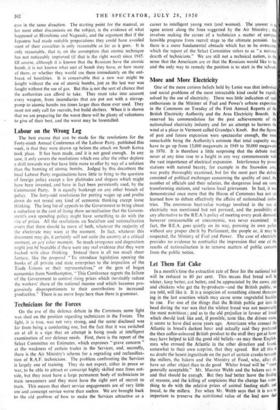Technicians for the Forces
On the eve of the defence debate in the Commons some light was shed on the position regarding technicians in the Forces. The light, it is true, was not very strong, and the scene disclosed was far from being a comforting one, but the fact that it was switched on at all is a sign that an attempt is being made at intelligent examination of our defence needs. First, there is the report of the Select Committee on Estimates, which expresses " grave concern " at the weakness of certain trades in the Services, and, secondly, there is the Air Ministry's scheme for a regrading and reclassifica- tion of R.A.F. technicians. The problem confronting the Services is largely one of training. They do not expect, either in peace or war, to be able to attract or conscript highly skilled men from out- side, but they must have a large permanent body of technicians to train newcomers and they must have the right sort of recruit to train. This means that short service engagements are of very little use and conscript service worse than useless. We are brought back to the old problem of how to make the Services attractive as a
career to intelligent young men (and women). The answer is to some extent along the lines suggested by the Air Ministry ; this involves making the career of a technician a matter of compre. hensible progress from recruit stage to the ultimate pension. But there is a more fundamental obstacle which has to be overcome, which the report of the Select Committee refers to as "a national dearth of technicians." We are still not a technical nation, in the sense that the Americans are or that the Russians would like to be and the only way to remedy the position is to start in the schools.


































 Previous page
Previous page